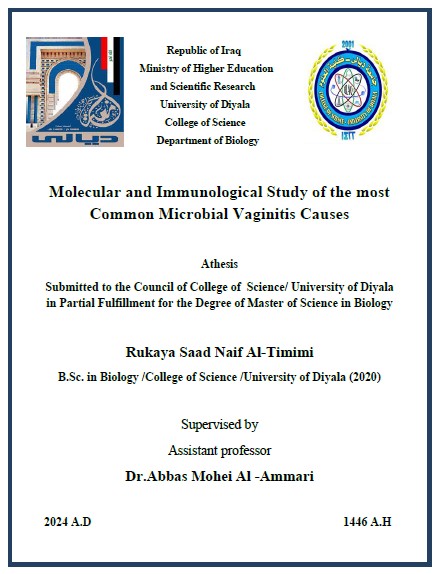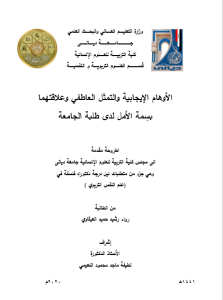Summary
Aims of.thesstudy was to identify the microbial causes of.vaginitis isolated from women underwent recurrent abortion and non aborted women (married and unmarried women). Also, this study was done to detect the virulence genes for resistance microbial isolates and relation of Interleukin-17 with vaginitis.
One hundred vaginal swabs were collected from women who attended (Al-Batoul women and children Hospital and Baladrooz general hospital) from 2ndJanuary to 30thApril 2024. The vaginal swabs were collected from womenwith vaginitis (50 samples were recurrent aborted women and 50 werenon aborted women) with age ranged from (17-55) years old. The diagnosis was done by consultant gynecologist. The microbial identification was based on cultural methods, VITEK system and molecular methods (Polymerase Chain Reaction and Genes sequencing) for Als5 and Hwp1 genes of Candida albicans isolates, CsgA and FimH genes of Escherichia coli and MecA gene of Staphylococcus aureus isolates.Using disk diffusion method, the susceptibility of microbial isolates was tested toward ( Clindamycin, metronidazole, Azithromycin, Amikacin, Cholramphenicol and Norfloxacin) antibiotics for bacterial isolates and (Nystatin, Miconozale, fluconazole and voriconazole) for C. albicans isolates. Enzyme linked immunosorbent assay (ELISA) method was done for detect IL-17 as immunological parameter for vaginitis.
Results revealed that the highly infection with vaginitis were among age group (21-29) years old for recurrent aborted women and non aborted women, with the percentages of (40 % and 38%), respectively. About of (72%) of the total samples were positive results for microbial growth. The microbial identification results were (27.8%, 38.9% and33.3%) for C. albicans, E. coli and Staph. aureus isolates, respectively. According to the results of antibiotic susceptibility, C. albicans isolates were the most resistance toward fluconazole, with a percentage of (45%).Isolates of E. coli and Staph.aureus were the most resistance toward Azithromycin, with the percentages (64% and 92%), respectively.
According to the molecular study, PCR results revealed that the molecular weights of C. albicans isolates for Als5 and Hwp1 genes were (318 bp and 503bp, respectively) with a percentage of both genes (69.2%). All isolates of E. coli were positive results for CsgA and FimH genes with the molecular weights (178bp and 508bp, respectively). Where as, the molecular weight of MecA gene for Staph. aureus isolates was (310bp), with a percentage of (66.7%). Genes sequencing results revealed that all isolates of C. albicans didn’t have any substitution mutations for both genes. For E. coli bacterium, one isolate has substitution mutation for CsgA gene while all isolates have substitution mutations for FimH gene. Two isolates of Staph. aureus have substitution mutations for MecA gene.
The results of immunological study show IL-17 levels were a highly significance differences among women with recurrent abortion.(P value< 0.001)





